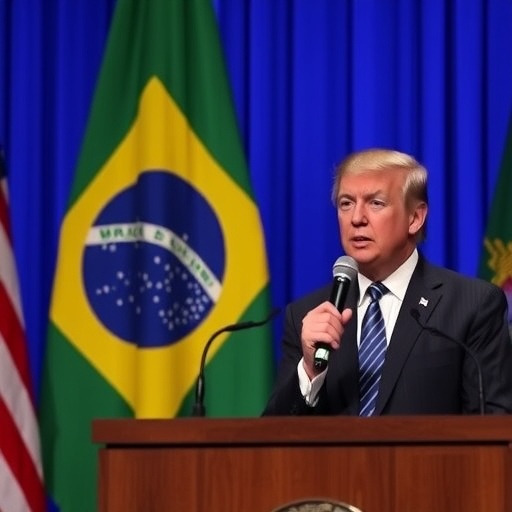Trump Proposes Brazil Tariff Relief to Secure Leniency for Bolsonaro in Election Interference Case
In a bold and unexpected diplomatic gambit at the ASEAN summit in Jakarta, U.S. President Donald Trump reportedly floated the idea of slashing Brazil tariffs on key imports in exchange for Brazilian President Luiz Inácio Lula da Silva showing leniency toward jailed former President Jair Bolsonaro. The proposal, which ties trade deals to political justice, has ignited global speculation about the intersection of economics and election integrity, especially given Bolsonaro‘s conviction for attempting to subvert Brazil’s 2022 election results.
The Trump-Lula meeting, held on the sidelines of the summit, lasted over an hour and delved into thorny issues ranging from environmental policies to hemispheric security. Sources close to the discussions reveal that Trump, known for his unorthodox approach to international relations, positioned the tariff relief as a “win-win” that could bolster U.S.-Brazil ties while addressing what he views as an unfair prosecution of Bolsonaro, a political ally. This move comes amid heightened tensions over election interference, with Bolsonaro currently serving a nine-year sentence for his role in the January 8, 2023, riots in Brasília, which echoed the U.S. Capitol events of two years prior.
Trump’s intervention marks a rare instance of a sitting U.S. president meddling in another nation’s judicial affairs, raising eyebrows among diplomats and legal experts. As the world watches, this proposal could reshape bilateral trade deals and test the limits of international comity in the face of populist solidarity.
Inside the Trump-Lula Meeting: A High-Stakes Diplomatic Exchange
The Trump-Lula meeting unfolded against the backdrop of the ASEAN summit’s focus on economic resilience and regional stability, but the conversation quickly veered into personal and political territory. Attendees described the atmosphere as cordial yet charged, with Trump emphasizing shared conservative values and Lula countering with Brazil’s commitment to democratic institutions. “We discussed how tariffs are hurting American farmers and Brazilian exporters alike,” a White House official told reporters post-meeting, hinting at the tariff relief offer without directly linking it to Bolsonaro.
According to leaks from Brazilian delegates, Trump explicitly raised Bolsonaro‘s plight, calling his conviction a “witch hunt” reminiscent of his own legal battles. Lula, who narrowly defeated Bolsonaro in 2022, reportedly listened politely but pushed back on any suggestion of judicial interference. “Brazil’s courts are independent,” Lula stated in a subsequent press briefing, underscoring his administration’s stance on upholding the rule of law following the election interference attempts that led to Bolsonaro‘s downfall.
The meeting’s timing is no coincidence. With U.S. midterm elections looming and Trump’s influence in global right-wing circles growing, this outreach to Lula—once a leftist icon—signals a pragmatic pivot. Data from the U.S. Trade Representative’s office shows that current Brazil tariffs on steel and aluminum, imposed during Trump’s first term, stand at 25% and 10%, respectively, affecting over $2 billion in annual trade. Reducing these could inject vitality into bilateral commerce, but at what cost to Brazil’s sovereignty?
Experts note that such linkage isn’t unprecedented; historical U.S. diplomacy has often woven economic incentives with political demands, from NAFTA renegotiations to sanctions relief for allies. Yet, tying tariff cuts to leniency for a convicted leader like Bolsonaro crosses into uncharted ethical territory, potentially straining relations with other Latin American partners wary of U.S. overreach.
Bolsonaro’s Conviction: Unpacking the Election Interference Charges
Bolsonaro‘s legal woes stem from a cascade of events following his 2022 election loss to Lula. Convicted in June 2023 by Brazil’s Superior Electoral Court, the former president was found guilty of spreading disinformation and inciting unrest to overturn the vote—a textbook case of election interference. The court’s 141-page ruling detailed how Bolsonaro and his allies fabricated claims of widespread fraud, mobilizing supporters for the violent Brasília invasion that damaged key government buildings.
Prosecutors presented evidence including leaked audio recordings where Bolsonaro discussed strategies to discredit electronic voting systems, Brazil’s cornerstone of electoral integrity since 1996. “This was not mere rhetoric; it was a coordinated effort to undermine democracy,” said Federal Prosecutor General Paulo Gonet, during the trial. The conviction barred Bolsonaro from running for office until 2030, a blow to his political ambitions and those of his far-right base.
Statistics underscore the gravity: Brazil’s election saw over 150 million voters, with turnout at 79.4%, the highest in decades. Yet, Bolsonaro‘s unfounded fraud allegations echoed globally, drawing parallels to Trump’s 2020 claims. Support for Bolsonaro remains fervent; polls from Datafolha indicate 30% of Brazilians still view him favorably, fueling protests and calls for amnesty.
Internationally, the case has drawn scrutiny from human rights groups. Amnesty International praised the conviction as a victory for accountability but warned against external pressures that could politicize justice. Trump’s offer of tariff relief in exchange for leniency revives debates on whether election interference prosecutions are tools of political revenge or necessary safeguards.
Within Brazil, the scandal has polarized society. Bolsonaro‘s family, including son Eduardo—a congressman and Trump confidant—has lobbied U.S. conservatives for support, organizing events in Florida to highlight perceived injustices. This transatlantic alliance now intersects with economic diplomacy, complicating Lula’s agenda of mending ties with Washington after years of frosty relations under Bolsonaro.
Brazil tariffs and Trade Deals: Economic Incentives at Play
At the heart of Trump’s proposal lies a web of Brazil tariffs and trade deals that have long defined U.S.-Brazil economic relations. Initiated in 2018 amid global steel overproduction concerns, these tariffs generated $1.4 billion in revenue for the U.S. but strained exporters on both sides. Brazilian steel giant CSN reported a 15% dip in U.S. market share post-imposition, while American manufacturers faced higher input costs, contributing to inflation pressures.
Recent data from the World Bank highlights Brazil’s export reliance: agriculture and commodities account for 60% of its $300 billion annual exports, with the U.S. as the second-largest partner after China. Easing Brazil tariffs could boost sectors like soybeans—where Brazil overtook the U.S. as the top global producer—and ethanol, aligning with Trump’s pro-farmer rhetoric. “This isn’t charity; it’s smart business,” Trump reportedly told Lula, citing potential job creation in Rust Belt states.
However, Lula’s administration has its own trade priorities. Brazil is negotiating a Mercosur-EU deal, valued at $100 billion in potential trade, and views U.S. overtures skeptically amid ongoing WTO disputes. Economists estimate that full tariff relief could add 0.5% to Brazil’s GDP growth, currently projected at 2.1% for 2024 by the IMF. Yet, accepting the deal tied to Bolsonaro risks domestic backlash from Lula’s left-wing coalition, which sees the ex-president as a threat to progressive gains.
Broader trade deals context includes the U.S.-Mexico-Canada Agreement (USMCA), which Trump touts as a model. Extending similar frameworks to Brazil could encompass digital trade and labor standards, but political strings attached to election interference leniency complicate negotiations. Trade analysts from the Peterson Institute for International Economics warn that such quid pro quo could invite retaliation from other nations, eroding U.S. credibility in fair trade advocacy.
- Key Trade Stats: U.S.-Brazil bilateral trade hit $88 billion in 2023, up 5% from 2022.
- Tariff Impact: Brazil’s retaliatory duties on U.S. goods like whiskey and motorcycles total $300 million annually.
- Potential Gains: Tariff cuts could save Brazilian firms $500 million yearly, per industry estimates.
Global Reactions: From Allies to Critics Weighing In
The Trump-Lula meeting and its tariff-for-leniency undertones have elicited a spectrum of responses. In the U.S., Republican lawmakers like Senator Ted Cruz praised Trump’s boldness, tweeting, “Standing up for allies like Bolsonaro while fixing bad trade deals—that’s leadership.” Democrats, however, decried it as interference; House Speaker Nancy Pelosi’s office issued a statement calling it “an inappropriate blending of economics and politics that undermines global democracy.”
In Brazil, reactions are equally divided. Bolsonaro‘s supporters rallied in São Paulo, chanting “Liberty!” and hailing Trump’s intervention as divine justice. Progressive groups, including the Landless Workers’ Movement, protested outside the presidential palace, accusing Lula of succumbing to foreign pressure. “This is not about tariffs; it’s about protecting fascists from accountability for election interference,” said activist Maria Fernandes in a viral op-ed.
Internationally, the EU expressed concern over potential trade ripple effects, with Commission President Ursula von der Leyen noting in a Brussels briefing that “judicial independence must not be a bargaining chip in trade deals.” ASEAN leaders, hosting the summit, remained neutral but privately urged restraint to avoid escalating tensions in the Americas.
Legal scholars like Harvard’s Laurence Tribe weighed in, arguing in a CNN interview: “Trump’s proposal flirts with violating international norms on non-interference, much like the very election interference it seeks to mitigate.” Polling from Ipsos shows 55% of Americans support easing Brazil tariffs for economic reasons, but only 32% back linking it to foreign politics.
Media coverage has amplified the drama, with outlets like The New York Times labeling it “Trump’s Populist Diplomacy 2.0,” while Fox News framed it as a defense of “anti-deep state warriors worldwide.” Social media buzz, with #TrumpSavesBolsonaro trending, underscores the story’s viral potential, blending geopolitics with personal vendettas.
Future Implications: Reshaping US-Brazil Ties and Beyond
As negotiations potentially unfold, the tariff relief offer could herald a new chapter in US-Brazil relations, or sow seeds of discord. Lula’s government faces a ticking clock: Bolsonaro‘s appeals process might reach Brazil’s Supreme Court by mid-2024, offering a window for leniency without overt capitulation. Meanwhile, Trump’s team is reportedly preparing a formal trade proposal, possibly including tech transfers and joint Amazon conservation efforts to sweeten the deal.
Economically, successful trade deals could stabilize commodity prices amid global inflation, benefiting U.S. consumers reliant on Brazilian coffee and beef. Yet, failure risks escalation; Brazil has hinted at aligning closer with BRICS partners like China, which already accounts for 30% of its trade. On the political front, leniency for Bolsonaro might embolden similar figures worldwide, from Hungary’s Orbán to India’s Modi allies, challenging democratic norms.
Looking ahead, the saga tests multilateral forums like the OAS, which could mediate if tensions boil over. For Trump, it’s a high-reward gamble to burnish his strongman image ahead of 2024 primaries. For Lula, balancing economic pragmatism with ideological purity will define his legacy. As one anonymous diplomat quipped, “In the game of thrones across the equator, tariffs might just be the new swords.” The world awaits Brazil’s next move, with implications rippling from Brasília to Washington.








